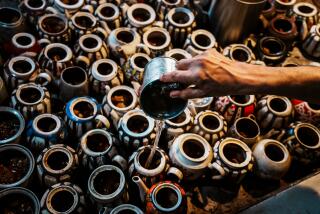Rich Tapestries Bring New Life to Poor Bangladeshi Women
DHAKA, Bangladesh — A Canadian welfare worker has revived the ancient art of tapestry making in Bangladesh, providing a new life for 200 destitute women in one of the world’s poorest countries.
The intricate, limited-edition “Nakshi Kantha” tapestries from the workshops of Skill Development for Underprivileged Women are prized by collectors and museums.
Some of the colorful, finely detailed works hang in Windsor Castle. Queen Elizabeth was so enchanted when she was presented with one as an official gift during a 1983 visit that she privately purchased two more.
Others will soon find their way to the United Nations and the Vatican as gifts of President Hossain Mohammad Ershad. Tapestries also have been presented to Britain’s Princess Anne and other distinguished visitors to this nation of 100 million people.
The beautiful, closely stitched silken tapestries are made by women who before joining the program had little or no means of support and little future outside begging or menial labor for meager portions of food.
The art of Nakshi Kantha--the phrase means “embroidered quilt” in Bengali--had been practiced by generations of Bengali women but had begun falling into disuse when Maureen Berlin, the affable wife of a Canadian diplomat, arrived in Bangladesh in 1980.
Arrived With Idea
“I had the idea before I came here that I wanted to do something with women,” Berlin said at the project’s center in central Dhaka.
At first she was involved in a project making jute craft work. But in 1981 she began working on the tapestries with two destitute women and a local artist.
“I knew we had something when two Japanese came by one day and offered us $1,000 for some of our work,” Berlin said.
The program formally began in March, 1982, with a $10,800 grant from the Canadian International Development Agency. It has received no other aid and has been self-supporting ever since.
The program is a rare example of self-sufficient success in a country of soul-crushing poverty.
“To my knowledge it’s the only program of its type that is self-supporting,” said Berlin, who recently left Dhaka to join her husband on another Asian assignment.
She’s a Legend
Berlin has become something of a legend among the large foreign aid community in the Bangladeshi capital, which disburses and administers nearly $2 billion a year.
“If you’re writing about foreign aid, be sure to talk to Maureen Berlin,” a U.N. administrator in Dhaka advised.
The program has grown until today 200 women are employed stitching tapestries that detail village scenes, religious processions, animals, legends and the like.
Many of the designs--all by Bangladeshi artists--are traditional. Others use more modern themes.
The tapestry to be presented to the United Nations by Ershad shows present-day village life and progress in the “New Bangladesh.”
The pieces range in size from 1-foot-square designs to some as large as 3 by 5 feet.
Prices go as high as $400. Each design is limited to 250 copies, with each tapestry signed by the artisan.
The women are paid 235 to 250 taka, about $7.10 to $7.60 for each completed square foot of work. The task takes about 10 days of careful labor, making tiny stitches on a pattern traced on silk.
Quality Control Maintained
“We check the stitches and maintain quality control,” said Berlin.
The tapestries are on display at the program’s headquarters and in Dhaka’s five-star Sonargaon Hotel. Some have been shown at the Royal Ontario Museum in Toronto.
The program provides transportation allowance, meals, subsidized health care and family planning assistance for the workers, and day care for about 100 of their children.
There are also nutrition and adult literacy classes for the workers, many of whom are widows or abandoned wives.
“In some cases, the husbands come back after the woman starts earning some money,” Berlin said. “In this society, that’s something.”
More to Read
Sign up for Essential California
The most important California stories and recommendations in your inbox every morning.
You may occasionally receive promotional content from the Los Angeles Times.










